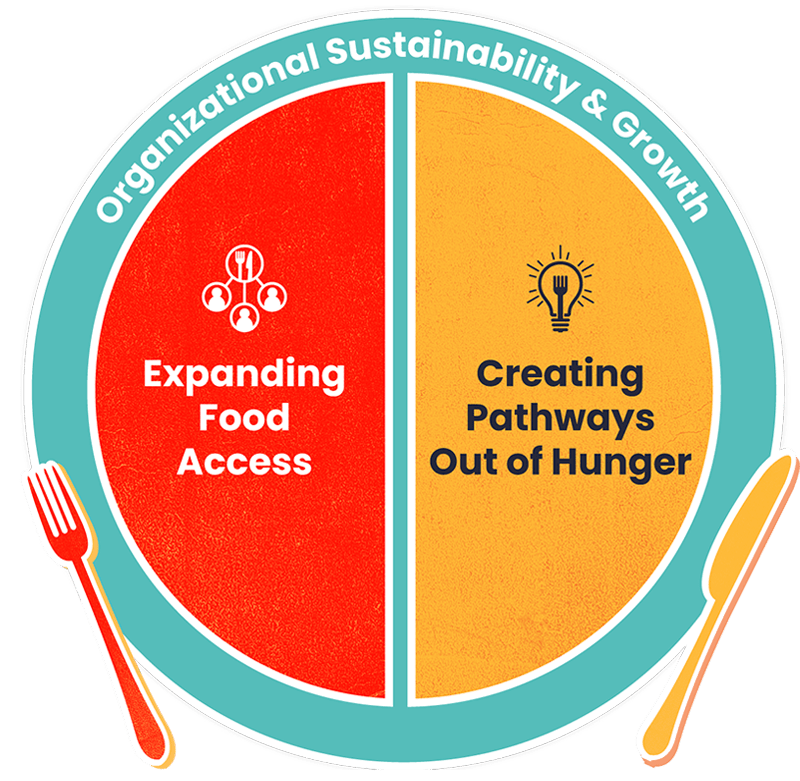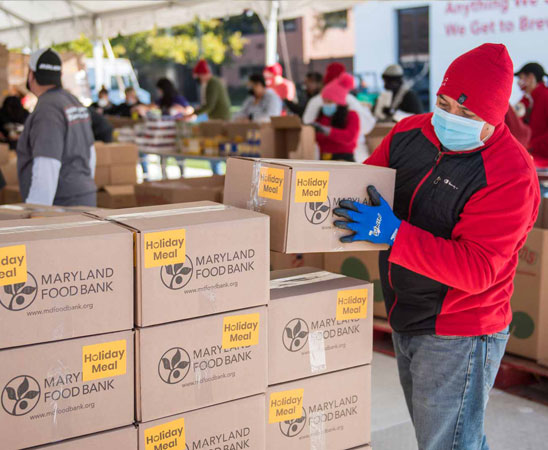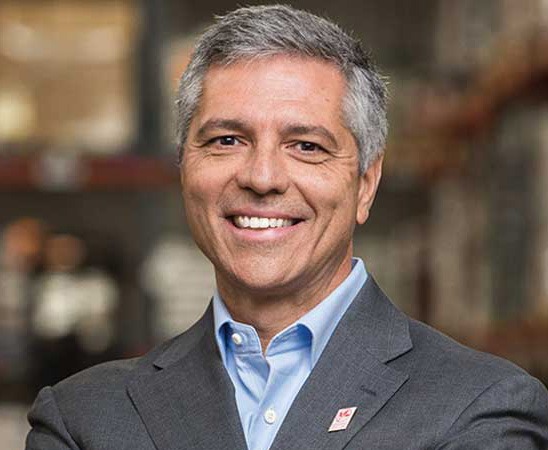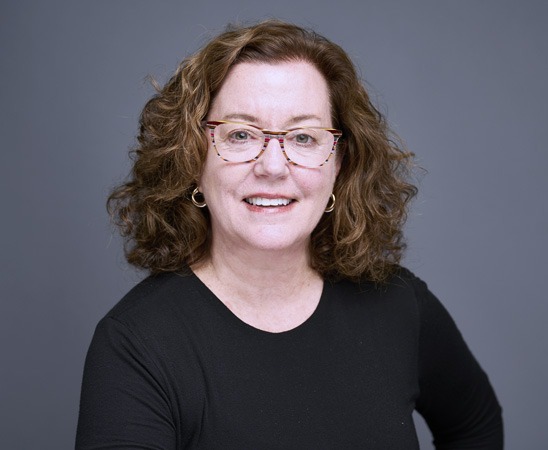The Maryland Food Bank’s Strategic Plan—which we call MFB 3.0—is our framework for working smarter, more efficiently, and with renewed energy to end hunger for more Marylanders by addressing not just food insecurity, but its systemic, root-level causes that keep up to two million of our neighbors from accessing the food they need.
MFB 3.0 Strategic Plan

MFB 3.0 Strategic Plan

By 2024, MFB's food distribution operations and sourcing will be faster, smarter, healthier, and more tailored to the needs of those we serve, through:
- Optimizing food distribution through operational efficiency
- Increasing food access to targeted populations and hunger hotspots
- Increasing the nutritional quality of food distributed
- Transforming the experience of the communities we serve to preserve dignity and remove stigma
- Purchasing locally-sourced food to strengthen food systems
By 2024, additional resources beyond food will be part of every interaction with those we serve, through:
- Expanding the capacities and capabilities of our distribution network
- Closing resource gaps for food-insecure Marylanders by working with partners to provide job training and wraparound services
- Changing outcomes for our communities through innovative partnerships
- Creating opportunities to enable people facing hunger to drive our work
- Preparing for ending hunger work
By 2024, additional resources beyond food will be part of every interaction with those we serve, through:
- Expanding the capacities and capabilities of our distribution network
- Closing resource gaps for food-insecure Marylanders by working with partners to provide job training and wraparound services
- Changing outcomes for our communities through innovative partnerships
- Creating opportunities to enable people facing hunger to drive our work
- Preparing for ending hunger work
By 2024, MFB's infrastructure, systems, and outreach will be stronger, increasing our ability to successfully fulfill our mission by:
- Moving from theory to practice in Diversity, Equity, and Inclusion (DEI) by applying a DEI lens to all aspects of MFB staff, partner, and community relationships
- Raising revenues from diverse sources to meet organizational objectives
- Leveraging technology and automation to continuously improve and inform decisions
- Engaging staff, inspiring them to learn, and equipping them with knowledge and skills needed to improve organizational outcomes
- Ensuring that we have the knowledge and systems to support an outcomes-driven strategy
- Aligning our Board of Directors’ engagement and funding with the direction of MFB
Pillar One:
Expanding Food Access
We’re experts at getting food to people who need it. And we learned from the pandemic how to do it even better and more efficiently. But COVID also reinforced the need to constantly innovate and adjust to the complex issue of food insecurity—and that we can’t do it alone. We need bold new ideas, approaches, and partners to make sure every hungry Marylander has reliable access to nutritious food.
We sourced, managed, and distributed food that provided more than 40 million meals last year, but the growing numbers—and the stories from our Network Partners on the front lines about rising food prices and costs of living—tell us this isn’t enough. So we’re expanding our partnerships with local farms and vendors to shorten the distance between food producers and consumers, and we’re building a more ecologically sustainable system that provides healthier, fresher, and more nutritious foods to all corners of our state.
Our Farm to Food Bank program is a remarkably successful example of expanding not just access to food, but access to healthier, locally grown produce through our growing number of Pantry on the Go locations.
We’re also using more localized data and scientific research to identify hunger hotspots and determine which food distribution programs work best within different communities. Exciting tools like our Maryland Hunger Map and Link2Feed software allow us to use demographics and technology to more accurately serve our neighbors in need, while new solutions like home delivery and the OrderAhead app will help ease the stigma many feel when reaching out for assistance.
Pillar Two:
Creating Pathways Out of Hunger
While distributing food more efficiently and equitably is vital to our mission, food insecurity is a complex, multi-layered socioeconomic problem, with no quick and easy fix. The second pillar of our strategic plan focuses on creating more opportunities for our neighbors in need by addressing the deeply rooted causes of hunger while opening up pathways out of food-insecurity and toward greater local resiliency.
It’s a big job, but we’ve already paved the way for hundreds of Marylanders to lift themselves out of economic insecurity—as the graduates of our FoodWorks program can attest. FoodWorks provides intensive culinary training that prepares graduates for well-paying careers in the food industry. After years of success at the food bank’s main facility in Halethorpe, the program is now expanding to a new site on the Eastern Shore (Wor-Wic Community College) so that even more Marylanders are able to receive job training that can lead to sustained employment.
And we’re expanding beyond FoodWorks to bring even more life-changing opportunities to those we serve. MFB is partnering with workforce development organizations across Baltimore to support residents on a path out of hunger through job training (in IT, solar, and healthcare), social and financial support, and food resources.
We’re also working with our Network Partners to help them provide more “wraparound” services—financial literacy programs, educational opportunities, and access to healthcare, as well as help finding clothing, furniture, and transportation assistance. We’re partnering with public officials and state and local agencies to support policy efforts that address these root causes of hunger as well.
As a food bank, we can always be relied upon to distribute food, of course, but unless we help tackle the deeper issues that cause food insecurity, we’ll never reach our goal of ending hunger in our state. MFB’s broadened scope aims to treat those systemic causes holistically—uplifting individuals and opening up new paths to financial stability and economic security.
Beyond feeding people, the Maryland Food Bank works with our statewide network of community partners to address the systemic, root-level causes of hunger.

Fortune 500 companies use data to better understand the needs of their customers, so they can offer products that solve a particular need. So why shouldn’t a nonprofit like the Maryland Food Bank use the same principles to make a greater impact on the lives of our neighbors in need?
Daniel Sturm
Vice President for Learning, Measurement, & Evaluation
Pillar Three:
Organizational Sustainability & Growth
None of this is achievable without our third pillar, which prioritizes organizational sustainability and growth. The road to Maryland’s recovery has been long and fraught, and the pandemic has taken its toll on every organization serving those in need, including the Maryland Food Bank.
Without sufficient attention to the individuals who do this hard work every day, we cannot expand our efforts to help others. That’s why we’ve invested in training programs, professional development, and staff assistance to keep our team recharged and revitalized, and we’ve expanded our workforce to meet the increased demands on our programs.
We strive to make our workplace representative of our state’s diverse population, with racial equity and inclusivity as guiding principles. All MFB staff receive Diversity, Equity, and Inclusion (DEI) training, and we make sure our partners embrace—and put into practice—those ideals. At MFB, diversity is not an afterthought—it’s who we are.
The rapid growth and expansion that are part of our strategic plan require new ways of thinking, and new tools. We continue to improve our internal processes, leverage innovative technologies wherever possible, and build automation into our workflows. We regularly audit our programs to make sure we’re functioning at optimum efficiency—and to see where we can do better.
Your Support Makes it Possible
Throughout the chaos of the pandemic, it became alarmingly clear to our entire nation just how many of our neighbors struggled to feed their families or were just a paycheck away from financial disaster. You supported us so we could help them in their time of deepest need, and we built our staff and operations to meet the challenge.
But even as the health risk from the pandemic wanes, the economic impacts of COVID-19 will not. Your continued support will be needed as we bring MFB 3.0 to fruition and create a future in which new pathways to sufficiency are readily available to help more Marylanders achieve lasting food security.
We’ve taken our pre-pandemic efforts, applied the lessons we learned during COVID, and emerged stronger with a revitalized strategic plan that expands food access and creates pathways out of hunger. However, we realize those efforts will only be possible if we first invest in our own sustainability and growth.
Carmen Del Guercio
Former President & CEO








